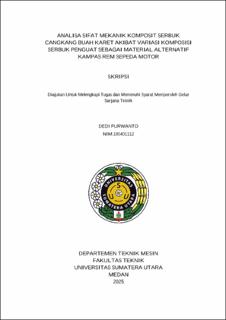Analisa Sifat Mekanik Komposit Serbuk Cangkang Buah Karet Akibat Variasi Komposisi Serbuk Penguat sebagai Material Alternatif Kampas Rem Sepeda Motor
Analysis of Mechanical Properties of Rubber Fruit Shell Powder Composite Due to Variations in the Composition of Reinforcing Powder as an Alternative Material for Motorcycle Brake Pads

Date
2025Author
Purwanto, Dedi
Advisor(s)
Nasution, Fadly Ahmad Kurniawan
Metadata
Show full item recordAbstract
At this time, the need for materials with certain characteristics is increasing along with technological developments, especially for power distribution systems and vehicle speed stopping. Brake pads are the main part of the brake system, which is generally made of asbestos or non-asbestos materials. This research aims to develop alternative brake pads made of composite materials made from rubber fruit shell powder (Hevea brasiliensis), copper powder and epoxy resin. Rubber fruit shells, which are agricultural waste, serve as material reinforcements, while epoxy resins serve as composite binders. The variation in composition in this study includes: 40% rubber fruit shell powder, 20% copper powder, and 40% epoxy resin (variation 1); 35% rubber fruit shell powder, 25% copper powder, and 40% epoxy resin (variation 2); as well as 30% rubber fruit shell powder, 30% copper powder, and 40% epoxy resin (variation 3). Tests are carried out on hardness, wear, and microstructure to determine the composition that gives the best results that are close to the quality of conventional motorcycle brake pads on the market. The results showed that the composition of 30% rubber shell powder, 30% copper powder, and 40% epoxy resin produced a hardness value of 25.29 BHN and a wear rate of8,4 x 10^(-6)g/〖mm〗^2.s, which was the closest to AHM brand brake pads with a hardness value of 28.44 BHN and a wear rate of7,5 x 10^(-6)g/〖mm〗^2.s. The microstructure of this composition also shows an even and homogeneous distribution of powder. Thus, brake pad composites made from rubber fruit shells and epoxy resins can be an effective and environmentally friendly alternative for the manufacture of motorcycle brake pads.
Collections
- Undergraduate Theses [975]
